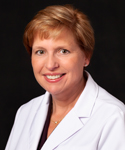Early in her medical school career, Beth Jonas, MD, FACR, was fascinated by the multi-system and chronic nature of rheumatic diseases. The field of rheumatology offered her the chance to make long-term connections with the patients she cares for, and she says her early instincts have led her to a career that has not disappointed.
As director of the rheumatology fellowship training program at the University of North Carolina, Chapel Hill, Dr. Jonas splits her time between clinical care with patients, clinical education with rheumatology fellows and leadership activities as director of the fellowship program and the chief of the Division of Rheumatology, Allergy and Immunology.
She has also given her time to the ACR in various volunteer roles for the past 15 years by participating in a number of committees and task forces. Her latest role with the ACR is chairing the Committee on Rheumatology Training and Workforce Issues—a role she says is tailor-made for her experience and passion to advance the educational IQ of the rheumatology community at large.
Focus on Education
As a leader in the rheumatology education realm since 2001, Dr. Jonas understands the critical role educators play in preparing rheumatologists to care for patients.
In light of the physician shortage the country faces, she says now is the time to shine a light on all aspects of rheumatology education, including increasing training spots to offset a physician shortage, as well as other solutions, such as focusing on advanced practice specialist training and increasing support for educators.
“It’s just as important to support those teaching new rheumatologists, because we need a strong group of educators to prepare the future rheumatologists who will care for our growing patient population,” she stresses.
Championing Training & Workforce Issues
Dr. Jonas believes one key strategy to address the physician shortage is looking more intently at ways to strengthen rheumatology education programs across the country.
She brings her frontline perspective on this work in her own institution to the committee.
“We are always looking at new and innovative tools to teach rheumatology to our students, residents and fellows, and ways we can support our faculty to advance in their profession,” she says. “With so many members of this committee leading rheumatology fellowship programs across the country, we bring strong collective knowledge to identify and develop strategic plans around these important issues.”
One of the committee’s first tasks will be to plan professional development needs for the College’s Program Directors’ Conference next March, and down the road for next year’s Annual Meeting. “I look forward to bringing innovative speakers and thought leaders on education to these important meetings for program directors,” she says.
The committee will also be focused on finding new ways for program directors to share the scholarship they are leading in their individual programs to better disseminate this knowledge to the broader rheumatology education community.
“Many members of this committee are scholars, and we feel as a group it is important to provide new outlets for these members to present their work and share what they are doing,” she shares.
Despite this ambitious agenda for ACR committee work and her other professional commitments, Dr. Jonas says downtime is also important to her. Outside of her work, she enjoys spending time with her family, playing music (she has played the flute since age 7), and winding down at the end of a long day with a nice glass of wine.
Carina Stanton is a freelance science journalist based in Denver.




